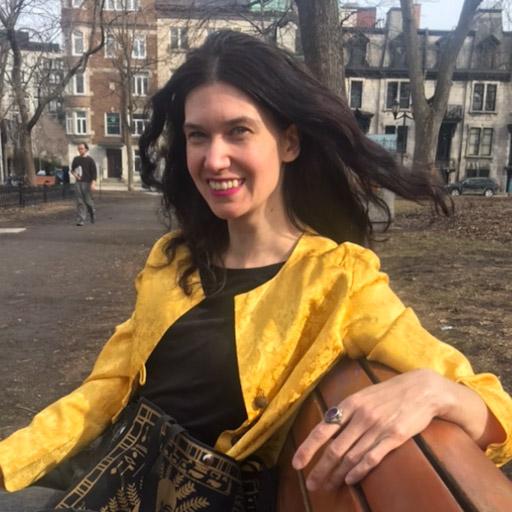
Photo: Tawny Andersen
Dr. Sandra Huber
Pronouns: she/her
- Lecturer and Area Head, Interdisciplinary Studies
- Lecturer, Art Education
Are you the profile owner?
Sign in to editResearch areas: feminist esotericism, witchy pedagogies, feminist material culture, occult media and communication studies, sleep studies, writing pedagogies, weird archives, disability studies, decolonial and critical race studies, posthumanism, interdisciplinary artistic methodologies with an emphasis on performance and ritual, research-creation, queer studies, psychoanalysis, poetics
Contact information
Email:
Websites:
Biography
Dr. Sandra Huber's main areas of interest include occulted practices and epistemologies; interdisciplinary and creative pedagogies with a focus on writing; feminist material culture; embodied research; and all these in combination.
Dr. Huber guides students through the creation of art work and thought work outside their disciplines, while re-imagining what constitutes foundational capacities in the Fine Arts, including writing (as somatic practice), researching (as activism), research-creation, and collectivity. How do keywords such as magic, failure, or embodiment act as knots to create interdisciplinary conversation and cultural work? As head of the Keywords Area (FFAR 248/249), she coordinates a Pedagogy Training Program for a teaching team of 20-plus graduate student Tutorial Leaders.
Her research focuses on interdisciplinary practices and pedagogies as well as occulted areas of knowledge-making, such as witchcraft, magic, sleep, dreams, spirit worlds, and scent, in other words, night knowledge. She looks in particular at how feminist material cultural and disability studies intersect with esoteric practices like spellcasting, ritual, and divination to create alter-abilities, helping us rethink capacity, ability, and possibility.
Dr. Huber holds a PhD in Interdisciplinary Humanities (Concordia), an MA in Creative Writing (University of Toronto), and a BA in English (Hons., Simon Fraser University).
Teaching activities
HUMA 889: Feminist Decolonial Esotericism (Winter 2027) ARTE 660/850: Ritual as Pedagogy (Fall 2025) FFAR 249: Keywords: Working Across Disciplines in the Fine Arts (ongoing) FFAR 248: Keywords: Engaging Across Disciplines in the Fine Arts (ongoing) FFAR 250: Keywords: Reading the Arts across the Disciplines (2022–24)
ENGL 212/4: English Composition, Stage I (2021)
ANTH 325: Magic, Science, Religion, and Ideology (2020)
WSDB/RELI 398C: Witches: Media, Magic and Culture (2018)
Publications
Assembling the Morrow: A Poetics of Sleep (Vancouver: Talonbooks, 2014), http://talonbooks.com/books/assembling-the-morrow.
“The Scent of Sleep: On Night Knowledge and Its Atmospheres,” Intermediality / Intermédialités, no. 41, Sleeping / Dormir (Spring 2023).
“Spirit, Writer: 19th-Century Mediumship and the Feminist Practice of (De)Inscription,” Feminist Media Histories, Embodiment issue (Summer 2020).
“Tears and Potions and Blood and Flames: Excesses of Transformation in Ari Aster’s Midsommar,” Frames Cinema Journal, Magical Women, Witches, and Healers issue (Winter 2019). https://framescinemajournal.com/article/blood-and-tears-and-potions-and-flame-excesses-of-transformation-in-ari-asters-midsommar.
“Fire, Earth, Ecstasy: Gossiping with the Gods,” Public Journal: Art, Culture, Ideas, Smoke issue (Winter 2019).
“Villains, Ghosts, and Roses, or How to Speak with the Dead,” Open Cultural Studies, Of Sacred Crossroads Issue (2019).
"Pornography, Ectoplasm, and the Secret Dancer: A Twin Reading of Naomi Uman's Removed," co-authored with Hilary Bergen, Screening the Past, issue 43 (April 2018), http://www.screeningthepast.com/issue-43-dossier-materialising-absence-in-film-and-media/pornography-ectoplasm-and-the-secret-dancer-a-twin-reading-of-naomi-umans-removed/
“Notes from an Educator: Who Are the Ancestors of the Witches?,” in Risa and Dickens and Amy Torok, Missing Witches: Recovering True Histories of Feminist Magic (Berkley, CA: North Atlantic Books, 2021).
Selected creative work:
"Ghost," Prism International 61.4 (Summer 2023).
“Last Night,” “Polyester (Cancer Moon),” “To Night,” The Posthumanist, Sleep / Schlaf, no. 1 (Winter 2022), 33, 49, 64.
“The Time Is,” The Town Crier, Ecopoetics issue, June 5, 2018,
http://towncrier.puritan-magazine.com/ephemera/sandra-huber.
“A Poet Goes to Work in a Sleep Laboratory: A Journal in Five Parts,” in Artists-in-Labs: Recomposing Art and Science, eds. Irène Hedigger and Jill Scott (Berlin: De Gruyter, 2016).
“The Wilfrid Tarot” (game), March 2016, https://sandrah.itch.io/the-wilfrid-tarot.
“Autobiography of Sleep,” Standart, vol. 2/3 (October 2016).
“Preface to Sleep,” Contemporary Verse 2 (Winter 2015).

